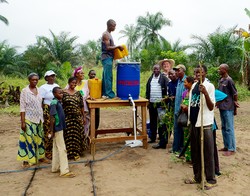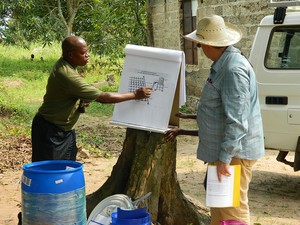It’s dry season, and a group of Congolese farmers huddles over a small opening in a tube that’s stretched across a field of arid, caked earth. They watch skeptically for water.
Their leeriness is understandable. Crops, starved of rain, are scarce this time of year in the Democratic Republic of the Congo. And there’s no waterbed nearby. If this new drip irrigation system doesn’t work they’re going to have to look for another source of food for the coming months. Then, what seems to be a miracle happens. A bead of water drips from the opening, and then another, and another.
“I watched this wide, incredulous smile spread across the face of an agricultural worker after she dug her finger deeply into the soil at the site of one of the small holes in the irrigation hose,” says Ruth Brown, a Presbyterian mission coworker in Congo who helped with the project. “The water had only been flowing for 10 minutes, but already water seeping from one tiny hole had sunk several inches deep into the earth.”
The water followed days of training and installation organized by a partnership of Congolese communities, Presbyterian World Mission, and a farmer from Texas who heard a call from God. From beneath a large brimmed hat that farmer, Charles Johnson, spearheaded a project in June to empower four communities in the remote West Kasai area of the DRC to build a quicker and more efficient way to transport their water. The impact is still unclear. If successful, the new irrigation system will reduce labor and provide a larger crop yield. That, in turn, will reduce hunger and generate increased income.
In a country where almost half of the population, on a good day, has no access to portable water, 87.7 percent survive on less than $1.25 per day, and one in four children is underweight and malnourished, water is more than a commodity—it is a matter of life and death. Traditionally, to water crops during the dry season (June–Aug.) farmers walk to the nearest waterbed and transport needed water in buckets.
“All water is carried by women balancing large plastic tubs on their heads,” says Brown. “Sometimes women must walk miles up and down steep hills to the springs.”
An irrigation system changes all that. Or could, if it works. “Because of Congo’s economic crisis, there are people who don’t have room to take risks,” says Jeff Boyd, a mission coworker and Presbyterian World Mission’s regional liaison for Central Africa. “If something doesn’t work and they’ve invested considerably in it, they’ve lost everything. They just don’t have space to lose.”
A revolution in agriculture also doesn’t happen overnight. Johnson previously visited Congo on mission trips and has long been an active member of the Congo Mission Network, a group of Presbyterians in the U.S. and in Congo who meet annually to discuss Congo’s needs and ministries.
Called by God after tragedy
Mission wasn’t always a part of Johnson’s life. For 18 years he and his wife cared for their son who, as an infant, suffered severe brain damage after having a tumor surgically removed. In a wheelchair, unable to speak and suffering from seizures, Johnson’s son was completely dependent on his parents. A void was left in Johnson’s life following his son’s death. And in the midst of that deep loss, compounded with the stress it placed on his marriage, Johnson heard a call from God. “I started giving God 100 percent, instead of just what I had budgeted for him,” he says. Six months later, Johnson was on a plane to Vietnam for his first mission trip.
After a while, though, even these trips were not enough. “I’m tired of being a tourist,” Johnson said to his wife one evening during a walk. “It doesn’t feel right to show up, take some pictures, paint some walls and then leave. I want to be in a place where I feel like I’m a partner…like I’m a part of the community. And I can’t do that in 10 days.”
This realization led Johnson to deepen his involvement including efforts to reopen a nutrition center in Congo and to connect with Presbyterian World Mission, which has long-standing relationships with partners in Congo and around the world.

Following the installation of the drip irrigation system for the women’s farming group near Kananga, everyone gathers for a photo as the drum is filled with water. —Ruth Brown
Partners on the ground
As Johnson talked with Congolese partners the idea for an irrigation system emerged. The project was perfect for Johnson who grew up on a farm in a small Texan town and studied agriculture at Texas A&M University. For help he reached out to Brown, who, as a mission coworker, is also a specialist for community development and sustainable agriculture. She connected Johnson with possible sites, arranged for translators and made sure all the community stakeholders were present for the training and installation.
Brown, Boyd and others from World Mission also helped by writing letters to Delta Airlines, explaining this was a humanitarian mission. Local agents of airline in San Antonio waived the cost of the extra luggage carrying equipment, saving the project nearly $2,000.
Four sites were chosen in total: the Tudisha Bana Bimpe Nutrition Center, the Butoke organization of orphanages and health clinic, a secondary school in Bulape, and a women’s group outside Kananga organized by Program for Development in Kasai (PRODEK).
The PRODEK site, in particular, has special Presbyterian connections. Founded 30 years ago through donations from children in Orange Presbytery (now New Hope Presbytery and Salem Presbytery) through the Presbyterian Hunger Fund, PRODEK trains and equips Congolese people to form associations that involve education, hunger alleviation, collective decision making, election of representations to settle land and pricing disputes, and their own banking systems.
PRODEK founded the women’s agricultural association that received the irrigation system and has been assisting them for the last five years. PRODEK also gives assistance to another of the four sites, the nutrition center.
Trained to succeed
Because of their involvement, PRODEK can provide follow-up technical assistance, monitoring and program evaluation. “And through PRODEK’s technical expertise, we are hopeful that the system may be replicated throughout their large network of agricultural associations,” says Brown. “Therefore, not only was the educational model one that combined instruction with hands-on practice, but the training became part of an existing support system.”
“The whole idea is working toward sustainability—getting to the point where they sustain their own projects,” says Johnson. For Johnson and Presbyterian World Mission, sustainability means partnership—doing with, not for. That’s why the major emphasis of the project was not on the installation. It was on the training.
Johnson was keen to avoid repeating past mistakes. “Africa is littered with failed projects of technology transfer,” he says. “Forget the fact that they don’t know how to maintain the equipment or have the parts to repair it when it breaks. They didn’t have any ownership. It wasn’t their idea. You can’t even start to work with folks until you get to know them and their culture. It’s an approach that takes a long time.”
Johnson and his wife Melissa have accepted a call to be mission coworkers in Zambia. They are in it for the long haul, along with Presbyterian World Mission.
-----
To support Presbyterian World Mission and efforts like these, give here. In addition, mission coworker Ruth Brown would welcome opportunities to speak with churches and presbyteries during her Interpretative Assignment in 2016 to encourage ongoing support of PRODEK. And Charles and Melissa Johnson, who are members of Northwood Presbyterian Church in San Antonio, TX, will be spending several months beginning in October 2015 speaking with churches and other groups. Please contact Melissa if you would like them to visit your church or group.

